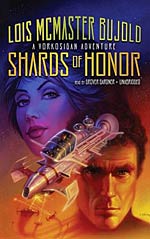
![]() couchtomoon
couchtomoon
2/6/2014
![]()
I wanted to hate this book, just so I could call it Sharts of Honor, but my ambivalence toward this series is bereft of any emotion strong enough to justify the effort of a scatological insult. Actually, I really wanted to love these two novels, just so I could identify with the legions of Lois McMaster Bujold fans who buoy her consistent status as the second most nominated, and second most won, author of Hugo Best Novel Awards.
But, alas, I remain unimpressed. I'm sorry, Bujold fans. Once again, I am just not cool enough to fit with the in-crowd.
Bujold advises Vorkosigan newbies to begin the series with Shards of Honor (1986) and Barrayar (1991), which is sometimes combined into the 1996 omnibus Cordelia's Honor. This advice goes against publication order, but both novels center on Cordelia Naismith, the mother of the great Miles Vorkosigan, the protagonist of other books in Bujold's series. Cordelia's stories act as an introduction to the world of Barrayaran politics, and provide a non-spoilery background for the uninitiated.
Shards of Honor
Shards of Honor is the better of the two novels, at least at first. Best described as adventure-romance, Shards explains the circumstances behind the unlikely romance of independent off-worlder Cordelia and her future husband, military and political powerhouse Lord Aral Vorkosigan. Abandoned by a military coup, enemy captain Vorkosigan takes Cordelia as his hostage and they trek across an unfamiliar planet toward his hidden cache of resources, towing along Cordelia's severely injured subordinate (ugh, this poor sod). Vorkosigan schemes his way back onto his ship, and Cordelia's prisoner-like status evolves, causing Cordelia to question her loyalty to her own planet. Warring and scheming bring the two together again, and they fall in love!
The Good: It begins with an exciting and imaginative romp across an unexplored planet, which brings us flying, blood-sucking jellyfish, and six-legged scavenger beasts.
The Bad: It gets a little Twilighty in the second half when Cordy gets a bad case of Conduct Disorder and practically drowns her therapist, manipulates a naive newsman, and hijacks a postal rocket… just to get to the man she loves. Not only is this behavior obsessive and codependent (i.e. bad for feminism), but it is inconsistent with the character's established behavior.
The Ugly: A terribly uncomfortable, and seemingly unnecessary, group rape/torture attempt occurs somewhere in the middle of the book. (Shame on you, Bujold, for falling on this trite plot device.) In fact, it seems every major character in Shards and Barrayar has some dark, sexually abused past, as if that's the only method Bujold knows to add depth to her characters.
Overall
Reading trumps T.V. and movie viewing because it affords us the luxury of exploring characters' internal thoughts and motives, but that's not the case with the Vorkosigan series. Bujold cheapens the reading experience by sacrificing perceptive, insightful narration for back-and-forth, expository dialogue. Shards and Barrayar is just A LOT of standing around and talking, which might make a good television, but it robs the novel of any emotional and psychological depth.
Despite the many, many weaknesses of these two novels, both Shards and Barrayar have moments of exciting storytelling, and some readers may be able to overlook the lazy technique and selfish protagonist. This is best recommended for SF readers who lean politically Right, where Cordelia's religious and pro-life philosophies can be appreciated.
http://couchtomoon.wordpress.com/2014/01/30/shards-of-honorbarrayar-vorkosigan-saga-by-lois-mcmaster